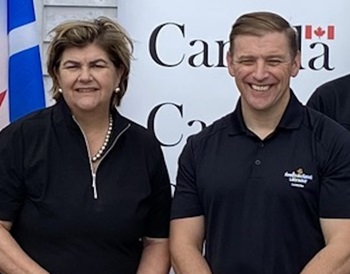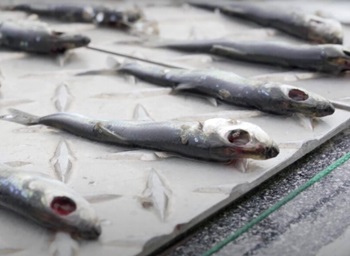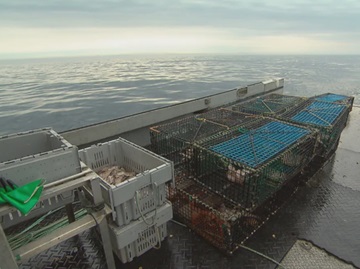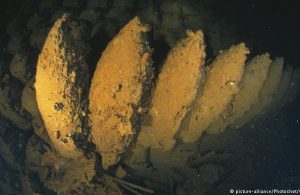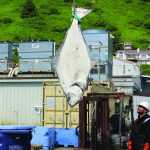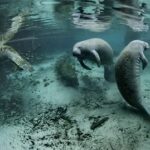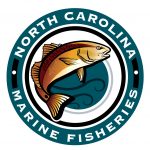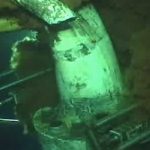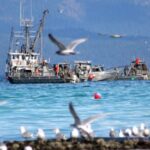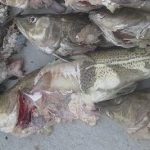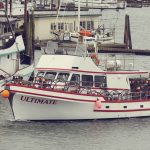 Canada’s top chefs should offer seal meat on their menus as part of the battle against Russian propaganda as well as celebrities who have spoken out against the seal hunt, a senate committee heard. At the same hearing, independent Senator Bev Busson suggested mega-singing star Taylor Swift might be used to convince young people to chow down on seal. But animal rights activists say claims that Russian propaganda is behind the problems of Canada’s seal industry is a bizarre conspiracy theory. Instead, they point to the ban by 35 nations on commercial seal products as the real reason the industry has declined. The ban, however, hasn’t stopped some from looking for new ways to revive the commercial seal industry. more. >>click to read<< 11:33
Canada’s top chefs should offer seal meat on their menus as part of the battle against Russian propaganda as well as celebrities who have spoken out against the seal hunt, a senate committee heard. At the same hearing, independent Senator Bev Busson suggested mega-singing star Taylor Swift might be used to convince young people to chow down on seal. But animal rights activists say claims that Russian propaganda is behind the problems of Canada’s seal industry is a bizarre conspiracy theory. Instead, they point to the ban by 35 nations on commercial seal products as the real reason the industry has declined. The ban, however, hasn’t stopped some from looking for new ways to revive the commercial seal industry. more. >>click to read<< 11:33
Tag Archives: DFO
Uncle, nephew who died at sea in Lark Harbour tragedy remembered
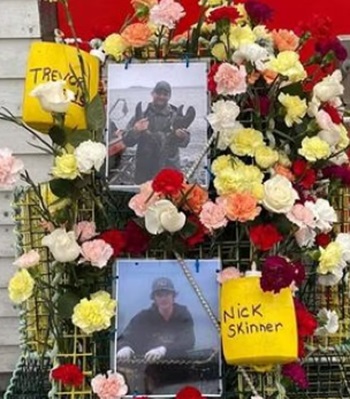 Two generations of a family were lost after a boat capsized on Newfoundland’s west coast this weekend, leaving a community in mourning. On Sunday morning, after a vessel carrying six people capsized, the Canadian Coast Guard ship Cape Edensaw was dispatched from Lark Harbour to the west coast. The coast guard launched a fast rescue craft into the water, recovering two bodies. They were Trevor Childs and his nephew Nicholas Skinner, says Fish, Food & Allied Workers secretary-treasurer Jason Spingle. News of the deaths travelled across Newfoundland and Labrador on Sunday and drew condolences from government officials and members of the fishing industry. Photos, more, >>CLICK TO READ<< 17:30
Two generations of a family were lost after a boat capsized on Newfoundland’s west coast this weekend, leaving a community in mourning. On Sunday morning, after a vessel carrying six people capsized, the Canadian Coast Guard ship Cape Edensaw was dispatched from Lark Harbour to the west coast. The coast guard launched a fast rescue craft into the water, recovering two bodies. They were Trevor Childs and his nephew Nicholas Skinner, says Fish, Food & Allied Workers secretary-treasurer Jason Spingle. News of the deaths travelled across Newfoundland and Labrador on Sunday and drew condolences from government officials and members of the fishing industry. Photos, more, >>CLICK TO READ<< 17:30
‘It doesn’t feel real,’ says Lark Harbour deputy mayor following death of 2 fishermen
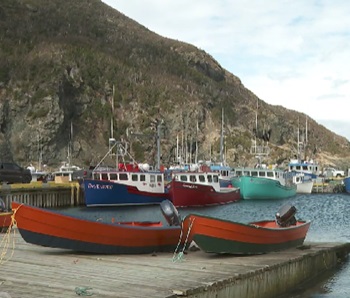 The Newfoundland community of Lark Harbour has been rocked by the deaths of two fishermen, who died after a boat capsized Sunday. The Canadian Coast Guard ship Cape Edensaw was dispatched from Lark Harbour on Sunday to the rugged shoreline of Newfoundland’s west coast and launched a fast rescue craft into the water. The crew soon recovered the two bodies and spotted four survivors on the shoreline. Lark Harbour Deputy Mayor Ria MacDonald said much of the town found out near lunchtime on Sunday. “‘Reeling’ is the only word to really use. Nobody expects to lose anyone, let alone on the first day of the season.… And the way it went down, from what I understand, is devastating,” MacDonald said Monday. Video, more, >>CLICK TO READ<< 11:45
The Newfoundland community of Lark Harbour has been rocked by the deaths of two fishermen, who died after a boat capsized Sunday. The Canadian Coast Guard ship Cape Edensaw was dispatched from Lark Harbour on Sunday to the rugged shoreline of Newfoundland’s west coast and launched a fast rescue craft into the water. The crew soon recovered the two bodies and spotted four survivors on the shoreline. Lark Harbour Deputy Mayor Ria MacDonald said much of the town found out near lunchtime on Sunday. “‘Reeling’ is the only word to really use. Nobody expects to lose anyone, let alone on the first day of the season.… And the way it went down, from what I understand, is devastating,” MacDonald said Monday. Video, more, >>CLICK TO READ<< 11:45
Man accused of assaulting conservation officer after elvers bust in downtown Dartmouth
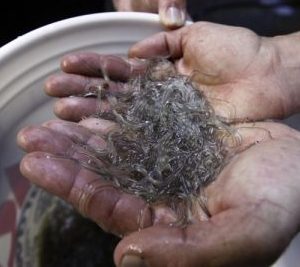 The alleged incident took place one week ago — not on a remote rural stream, but on the Shubenacadie Canal in downtown Dartmouth. The federal Fisheries Department and the provincial Department of Natural Resources called police to the 100 block of Alderney Drive shortly before 10 p.m. local time on April 10. A spokesperson for the Halifax Regional Police, Const. Ann Giffin, said a 39-year-old man was arrested and is due in court at a later date. James Nevin maintained he did nothing wrong. He claimed conservation officers did not identify themselves and that he was sprayed with bear spray in the course of his arrest at Martins Park. more, >>CLICK TO READ<< 11:09
The alleged incident took place one week ago — not on a remote rural stream, but on the Shubenacadie Canal in downtown Dartmouth. The federal Fisheries Department and the provincial Department of Natural Resources called police to the 100 block of Alderney Drive shortly before 10 p.m. local time on April 10. A spokesperson for the Halifax Regional Police, Const. Ann Giffin, said a 39-year-old man was arrested and is due in court at a later date. James Nevin maintained he did nothing wrong. He claimed conservation officers did not identify themselves and that he was sprayed with bear spray in the course of his arrest at Martins Park. more, >>CLICK TO READ<< 11:09
Accused poachers ‘cannot pretend to hide,’ says province’s top court
 New Brunswick’s highest court has shed light on an important decision it made in a lawsuit against alleged poachers accused of stealing baby eels. The Court of Appeal delivered its reasons late last month why it had ordered the province’s registrar of motor vehicles to turn over the names of 115 vehicle owners to Rothesay businesswoman Mary Ann Holland, the owner of Brunswick Aquaculture Limited and Alder Seafood Limited. Her lawyer Barry Morrison argued in a filing last month that Holland and her staff had witnessed dozens of people illegally catching lucrative baby eels in river estuaries in the spring of 2023 after Ottawa had closed the fishery. more, >>click to read<< 07:53
New Brunswick’s highest court has shed light on an important decision it made in a lawsuit against alleged poachers accused of stealing baby eels. The Court of Appeal delivered its reasons late last month why it had ordered the province’s registrar of motor vehicles to turn over the names of 115 vehicle owners to Rothesay businesswoman Mary Ann Holland, the owner of Brunswick Aquaculture Limited and Alder Seafood Limited. Her lawyer Barry Morrison argued in a filing last month that Holland and her staff had witnessed dozens of people illegally catching lucrative baby eels in river estuaries in the spring of 2023 after Ottawa had closed the fishery. more, >>click to read<< 07:53
Mi’kmaw fishers say DFO officers left them to walk for hours at night after seizing boots, phones
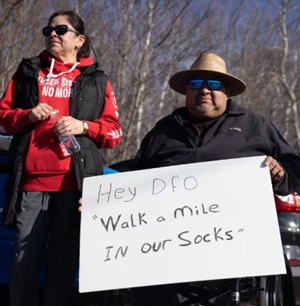 Two Mi’kmaw elver fishermen say they were forced to walk in sock feet for hours along a rural Nova Scotia highway in the middle of the night last week after they were detained by federal fisheries officers who took their boots and phones before releasing them. Blaise Sylliboy and Kevin Hartling, who assert they have a treaty right to fish for the lucrative baby eels despite this year’s season being cancelled, were joined Tuesday morning by dozens of protesters outside the Department of Fisheries and Oceans building in Dartmouth, N.S. “When we were walking, there’s times I’m like, ‘Man, if we stop, we’re going to die,’ because our feet were just soaked,” said Hartling. more, >>click to read<< 06:22
Two Mi’kmaw elver fishermen say they were forced to walk in sock feet for hours along a rural Nova Scotia highway in the middle of the night last week after they were detained by federal fisheries officers who took their boots and phones before releasing them. Blaise Sylliboy and Kevin Hartling, who assert they have a treaty right to fish for the lucrative baby eels despite this year’s season being cancelled, were joined Tuesday morning by dozens of protesters outside the Department of Fisheries and Oceans building in Dartmouth, N.S. “When we were walking, there’s times I’m like, ‘Man, if we stop, we’re going to die,’ because our feet were just soaked,” said Hartling. more, >>click to read<< 06:22
DFO delays opening of crab season by a week, staving off more fish harvester protests
 The federal government has agreed to push back the opening of the snow crab season, following a request from the fisheries union and a threat of more protests. The Department of Fisheries and Oceans made the announcement Monday evening, a day after the Fish, Food & Allied Workers union wrote to the department and asked for a one-week delay. Fish harvesters wanted time to iron out the details of an agreement last week with the provincial government to implement sweeping changes to the industry that would affect the upcoming season. DFO initially denied that request, releasing its management plan Monday morning with an expected start date of April 1, prompting influential fisherman John Efford to threaten to rally protesters outside the DFO office in St. John’s. more, >>click to read<< 17:31
The federal government has agreed to push back the opening of the snow crab season, following a request from the fisheries union and a threat of more protests. The Department of Fisheries and Oceans made the announcement Monday evening, a day after the Fish, Food & Allied Workers union wrote to the department and asked for a one-week delay. Fish harvesters wanted time to iron out the details of an agreement last week with the provincial government to implement sweeping changes to the industry that would affect the upcoming season. DFO initially denied that request, releasing its management plan Monday morning with an expected start date of April 1, prompting influential fisherman John Efford to threaten to rally protesters outside the DFO office in St. John’s. more, >>click to read<< 17:31
You’re Young and Want to Make It Fishing? Good Luck
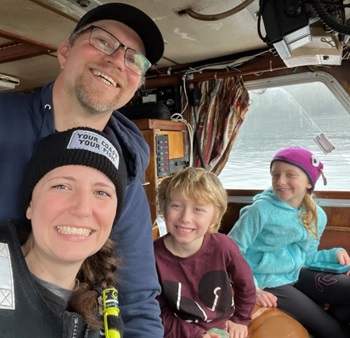 Duncan Cameron is a fisherman, like his dad and his dad’s dad before him. They count themselves among the scores of families who have made their livings on the water, pulling riches from the deep. But today, Cameron says young fishers like him are being priced out. Cameron is part of a group of fishers, conservationists and politicians who say independent owner-operators like himself are increasingly competing with big money to get a finite number of government licenses and quota they need to fish. Today, some of those licenses are worth hundreds of thousands or even more than a million dollars, something Cameron said has allowed major corporations to control a growing stake in a public resource. photos, more, >>click to read<< 07:27
Duncan Cameron is a fisherman, like his dad and his dad’s dad before him. They count themselves among the scores of families who have made their livings on the water, pulling riches from the deep. But today, Cameron says young fishers like him are being priced out. Cameron is part of a group of fishers, conservationists and politicians who say independent owner-operators like himself are increasingly competing with big money to get a finite number of government licenses and quota they need to fish. Today, some of those licenses are worth hundreds of thousands or even more than a million dollars, something Cameron said has allowed major corporations to control a growing stake in a public resource. photos, more, >>click to read<< 07:27
Warming waters send Gaspé’s northern shrimp stock plummeting, spelling trouble for Quebec fishermen
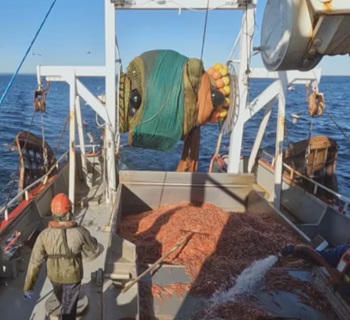 Every year, Fourchette Bleue, which promotes what it calls “under-exploited” marine species in the St. Lawrence for consumption, releases a list of recommended sustainable seafood products for consumers. Toad crabs, oysters and green sea urchins all made the cut this year, but for the first time, the northern shrimp did not. That’s because stocks of the shrimp have taken a major dive in recent years, causing concern in the local fishing industry as Fisheries and Oceans Canada (DFO) floats the idea of potentially closing fisheries in the near future. more, >>click to read<< 07:28
Every year, Fourchette Bleue, which promotes what it calls “under-exploited” marine species in the St. Lawrence for consumption, releases a list of recommended sustainable seafood products for consumers. Toad crabs, oysters and green sea urchins all made the cut this year, but for the first time, the northern shrimp did not. That’s because stocks of the shrimp have taken a major dive in recent years, causing concern in the local fishing industry as Fisheries and Oceans Canada (DFO) floats the idea of potentially closing fisheries in the near future. more, >>click to read<< 07:28
Put rules in writing to fix Maritime elver fishery’s enforcement problem, say businesses
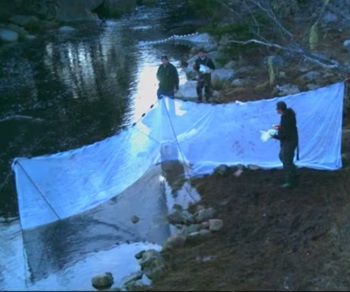 Representatives of the $45-million Maritime elver fishery are calling on the federal government to implement enforceable regulations for moderate livelihood fishing by Indigenous people. They told a Senate committee in Ottawa Thursday the failure to define or regulate moderate livelihood rights by the Department of Fisheries and Oceans (DFO) is one reason for the uncontrolled harvest of baby eels on dozens of rivers in Nova Scotia and New Brunswick. “Among these poachers are First Nations unwilling to work with DFO to access the fishery under a banner of moderate livelihood rights, backed by organized crime, specifically biker gangs and foreign smuggling networks. Our once peaceful industry has recently faced violent disruption,” said Genna Carey, a commercial licence holder speaking on behalf of the Canadian Committee for a Sustainable Eel Fishery, an industry group. more, >>click to read<< 09:29
Representatives of the $45-million Maritime elver fishery are calling on the federal government to implement enforceable regulations for moderate livelihood fishing by Indigenous people. They told a Senate committee in Ottawa Thursday the failure to define or regulate moderate livelihood rights by the Department of Fisheries and Oceans (DFO) is one reason for the uncontrolled harvest of baby eels on dozens of rivers in Nova Scotia and New Brunswick. “Among these poachers are First Nations unwilling to work with DFO to access the fishery under a banner of moderate livelihood rights, backed by organized crime, specifically biker gangs and foreign smuggling networks. Our once peaceful industry has recently faced violent disruption,” said Genna Carey, a commercial licence holder speaking on behalf of the Canadian Committee for a Sustainable Eel Fishery, an industry group. more, >>click to read<< 09:29
B.C. seeks $6 million in properties allegedly tied to illegal crab-sales scheme
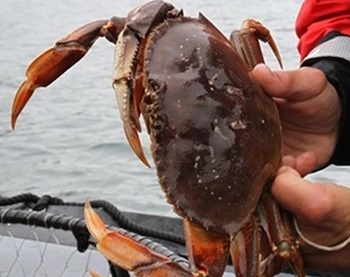 The B.C. government is seeking forfeiture of properties valued at more than $6 million that it alleges were tied to a scheme to sell illegally crabs that were meant for food for First Nations. In a lawsuit filed in B.C. Supreme Court, the province alleges that two commercial properties in Richmond, a house in Vancouver and a pickup truck, are the instruments and proceeds of “unlawful activity” linked to the illegal crab-sales scheme. Named in the suit are Jamin Chiong, who sold the crab to seafood wholesaler Million Ocean Seafood Ltd., and the owners of that company, Tsz Wah Fok, Peng Lin and Tak Yi Tong. None of those named in the suit have responded and the allegations have not been proven in court. more, >>click to read<< 18:47
The B.C. government is seeking forfeiture of properties valued at more than $6 million that it alleges were tied to a scheme to sell illegally crabs that were meant for food for First Nations. In a lawsuit filed in B.C. Supreme Court, the province alleges that two commercial properties in Richmond, a house in Vancouver and a pickup truck, are the instruments and proceeds of “unlawful activity” linked to the illegal crab-sales scheme. Named in the suit are Jamin Chiong, who sold the crab to seafood wholesaler Million Ocean Seafood Ltd., and the owners of that company, Tsz Wah Fok, Peng Lin and Tak Yi Tong. None of those named in the suit have responded and the allegations have not been proven in court. more, >>click to read<< 18:47
Snow crab stock projected to remain healthy, for the most part, in 2024
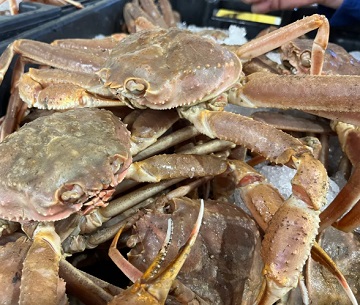 Fisheries and Oceans Canada released its annual stock assessment on snow crab Tuesday in St. John’s, and the data indicates the stock remains on par with last year with no major changes. That means the stock is projected to remain healthy for the majority of fishing areas around the province, with one exception. The 2HJ zone off the east coast of Labrador remains in the cautious zone, similar to last year’s assessment. But the positive news may be a result of an ocean cooling period that happened between 2012 and 2018. Snow crab flourish in colder water, allowing young crab the ability to grow to exploitable age and size. That’s between nine and 13 years old with a shell size of over 94 mm for males. Female crab cannot be retained by harvesters. more, >>click to read<< 15:06
Fisheries and Oceans Canada released its annual stock assessment on snow crab Tuesday in St. John’s, and the data indicates the stock remains on par with last year with no major changes. That means the stock is projected to remain healthy for the majority of fishing areas around the province, with one exception. The 2HJ zone off the east coast of Labrador remains in the cautious zone, similar to last year’s assessment. But the positive news may be a result of an ocean cooling period that happened between 2012 and 2018. Snow crab flourish in colder water, allowing young crab the ability to grow to exploitable age and size. That’s between nine and 13 years old with a shell size of over 94 mm for males. Female crab cannot be retained by harvesters. more, >>click to read<< 15:06
With the elver harvesting season on the line, some Mi’kmaw chiefs are scrambling for options
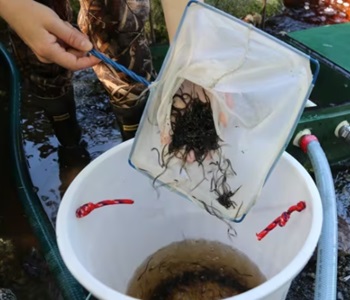 Fisheries Minister Diane Lebouthillier has said that due to violence, threats, widespread unauthorized harvesting and potential harm to elver stocks the season should be cancelled because it was “not possible to have a safe and sustainable elver fishery.” Key elements of the Mi’kmaw proposal include monitoring total allowable catches, enhancing traceability using GPS and responsibly managing the fishery. It would also double their total allowable catch. Gerald Toney, fisheries co-lead for the Assembly of Nova Scotia Mi’kmaq Chiefs, said communities still need to discuss future plans and whether harvesters will continue to fish even with a ban in place. more, >>click to read<< 08:01
Fisheries Minister Diane Lebouthillier has said that due to violence, threats, widespread unauthorized harvesting and potential harm to elver stocks the season should be cancelled because it was “not possible to have a safe and sustainable elver fishery.” Key elements of the Mi’kmaw proposal include monitoring total allowable catches, enhancing traceability using GPS and responsibly managing the fishery. It would also double their total allowable catch. Gerald Toney, fisheries co-lead for the Assembly of Nova Scotia Mi’kmaq Chiefs, said communities still need to discuss future plans and whether harvesters will continue to fish even with a ban in place. more, >>click to read<< 08:01
Richmond seafood processing company fined $40,000 for undersized crabs
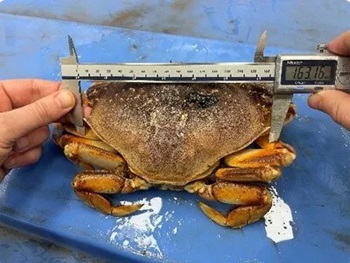 A routine inspection of commercial seafood processing plants by Fisheries and Oceans Canada (DFO) fishery officers in January 2023 resulted in a fine of $40,000. On December 6, 2023, Tenshi Seafood Limited was handed down the fine in after pleading guilty to the possession of undersize crabs by a commercial business, which is a violation of Canada’s Fisheries Act. This is the second significant fine for Tenshi Seafood Limited, which was also fined $75,000 in January 2020 for obstruction and ordered to comply with various conditions. more, >>click to read<< 11:18
A routine inspection of commercial seafood processing plants by Fisheries and Oceans Canada (DFO) fishery officers in January 2023 resulted in a fine of $40,000. On December 6, 2023, Tenshi Seafood Limited was handed down the fine in after pleading guilty to the possession of undersize crabs by a commercial business, which is a violation of Canada’s Fisheries Act. This is the second significant fine for Tenshi Seafood Limited, which was also fined $75,000 in January 2020 for obstruction and ordered to comply with various conditions. more, >>click to read<< 11:18
Canada proposes shutdown of troubled Maritime elver fishery in 2024
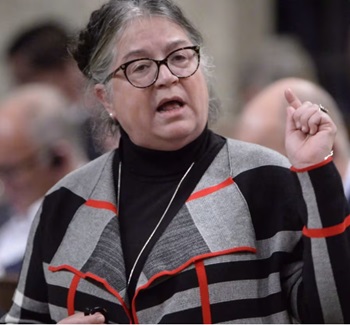 The federal government has served notice it intends to close the commercial fishery for baby eels, or elvers, in the Maritimes this year — six weeks before the season is set to open. Minister of Fisheries and Oceans Diane Lebouthillier informed licence holders Tuesday and gave them until Feb. 23 to respond. Lebouthillier said there was not enough time for the Department of Fisheries and Oceans (DFO) to implement enhanced “access for Indigenous communities, a new regulatory framework to regulate and licence the possession and export of elvers, and a suite of operational changes to the management of the elver fishery.” “Based on all the above, it is my view that it is not possible to have a safe and sustainable elver fishery in 2024, and therefore the fishery should not be opened,” Lebouthillier wrote. more, >>click to read<< 16:46
The federal government has served notice it intends to close the commercial fishery for baby eels, or elvers, in the Maritimes this year — six weeks before the season is set to open. Minister of Fisheries and Oceans Diane Lebouthillier informed licence holders Tuesday and gave them until Feb. 23 to respond. Lebouthillier said there was not enough time for the Department of Fisheries and Oceans (DFO) to implement enhanced “access for Indigenous communities, a new regulatory framework to regulate and licence the possession and export of elvers, and a suite of operational changes to the management of the elver fishery.” “Based on all the above, it is my view that it is not possible to have a safe and sustainable elver fishery in 2024, and therefore the fishery should not be opened,” Lebouthillier wrote. more, >>click to read<< 16:46
Gulf of St. Lawrence redfish population in decline even before fishery reopens, report finds
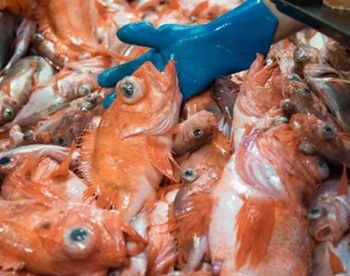 The latest scientific assessment of the redfish population in the Gulf of St. Lawrence has sobering news even as fishing groups in Atlantic Canada and Quebec fight over who will get to catch it: their numbers are rapidly shrinking. “I think we’re at the point that we’re clearly seeing that there’s a limit to this boom,” says federal scientist Caroline Senay, the redfish specialist at the Department of Fisheries and Oceans (DFO). The report comes in advance of DFO’s plan to reopen the fishery later this year after it collapsed in the early 1990s and has been closed since 1995. more, >>click to read<< 09:20
The latest scientific assessment of the redfish population in the Gulf of St. Lawrence has sobering news even as fishing groups in Atlantic Canada and Quebec fight over who will get to catch it: their numbers are rapidly shrinking. “I think we’re at the point that we’re clearly seeing that there’s a limit to this boom,” says federal scientist Caroline Senay, the redfish specialist at the Department of Fisheries and Oceans (DFO). The report comes in advance of DFO’s plan to reopen the fishery later this year after it collapsed in the early 1990s and has been closed since 1995. more, >>click to read<< 09:20
Scotian Shelf shrimp fishery braces for another cut
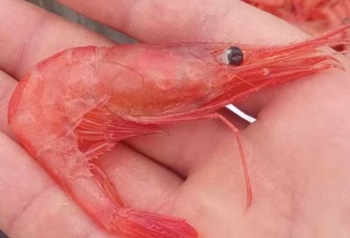 For a third straight year, the shrimp fishery off eastern Nova Scotia is facing a big quota cut with ocean conditions to blame. The recent scientific assessment for northern shrimp on the eastern Scotian Shelf showed environmental factors — including warmer ocean water due to climate change — are contributing to the poor condition of the stock, he says. And the response, he predicts, will be a reduction in the total allowable catch. The Department of Fisheries and Oceans (DFO) is expected to announce the 2024 shrimp quota in several weeks. more, >>click to read<< 10:59
For a third straight year, the shrimp fishery off eastern Nova Scotia is facing a big quota cut with ocean conditions to blame. The recent scientific assessment for northern shrimp on the eastern Scotian Shelf showed environmental factors — including warmer ocean water due to climate change — are contributing to the poor condition of the stock, he says. And the response, he predicts, will be a reduction in the total allowable catch. The Department of Fisheries and Oceans (DFO) is expected to announce the 2024 shrimp quota in several weeks. more, >>click to read<< 10:59
Commercial Cod Harvesters Opposed to Drastic Increases in Rec. Fishery
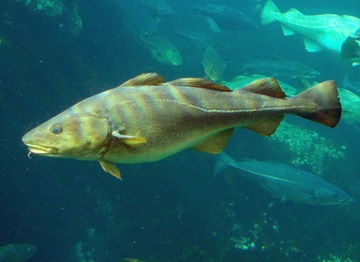 Commercial fish harvesters in Newfoundland and Labrador are calling for stricter monitoring of the recreational cod fishery in the province and assert that unaccounted for removals in the recreational fishery could threaten the conservation integrity of the stock. The petition to the federal government supported by Conservative MP Clifford Small is to more than double the number of days in the recreational fishery from 39 to roughly 90. Recreational removals are a significant source of uncertainty in DFO science and management and is blatantly contradictory to the Department’s mandate to monitor fish landings. more, >>click to read<< 14:04
Commercial fish harvesters in Newfoundland and Labrador are calling for stricter monitoring of the recreational cod fishery in the province and assert that unaccounted for removals in the recreational fishery could threaten the conservation integrity of the stock. The petition to the federal government supported by Conservative MP Clifford Small is to more than double the number of days in the recreational fishery from 39 to roughly 90. Recreational removals are a significant source of uncertainty in DFO science and management and is blatantly contradictory to the Department’s mandate to monitor fish landings. more, >>click to read<< 14:04
Five people, three companies convicted of 18 violations in N.S. halibut fishery
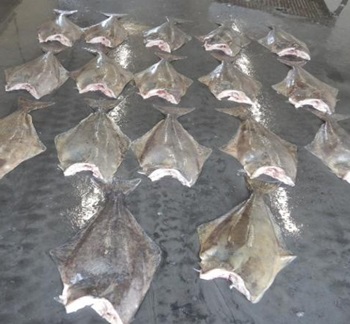 A major investigation into the halibut fishery in the Sambro area of Nova Scotia has led to multiple fines and licence suspensions. Five people and three companies were convicted of 18 violations of the Fisheries Act and Regulations. The Department of Oceans and Fisheries (DFO) conducted the investigation, according to a Tuesday news release.DFO originally laid 66 charges against eight individuals and five companies in 2021. “Harvesters who break the law give themselves an unfair advantage, undermine the effective management of the fishery, and threaten the sustainability of our shared fishery resources,” says DFO in the release. Links, more, >>click to read<< 10:43
A major investigation into the halibut fishery in the Sambro area of Nova Scotia has led to multiple fines and licence suspensions. Five people and three companies were convicted of 18 violations of the Fisheries Act and Regulations. The Department of Oceans and Fisheries (DFO) conducted the investigation, according to a Tuesday news release.DFO originally laid 66 charges against eight individuals and five companies in 2021. “Harvesters who break the law give themselves an unfair advantage, undermine the effective management of the fishery, and threaten the sustainability of our shared fishery resources,” says DFO in the release. Links, more, >>click to read<< 10:43
Commercial redfish fishery to reopen, but pending quota threatens to push some fishers out
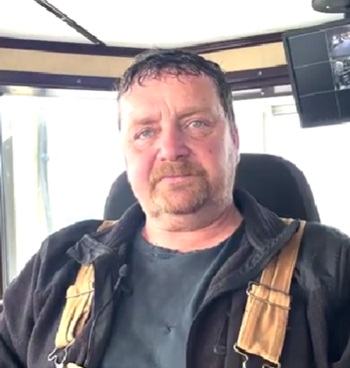 “It hurts me to talk about it,” says Brad Genge, a 51-year-old inshore fisherman from Anchor Point, on the west coast of Newfoundland’s northern peninsula. Genge says what should have been a good news story – the Government of Canada’s historic reopening of the east coast commercial redfish fishery – is hitting fishermen in this province hard. “Worst news we could have gotten,” says Genge. “Only thing that could have hurt more is if they came down and hit us in the face with a piece of lumber.” “We are done, we are out of the fishery,” says Genge, who tied up his trawler, the BNB Mariner, in early February. Video, more, >>click to read<< 08:22
“It hurts me to talk about it,” says Brad Genge, a 51-year-old inshore fisherman from Anchor Point, on the west coast of Newfoundland’s northern peninsula. Genge says what should have been a good news story – the Government of Canada’s historic reopening of the east coast commercial redfish fishery – is hitting fishermen in this province hard. “Worst news we could have gotten,” says Genge. “Only thing that could have hurt more is if they came down and hit us in the face with a piece of lumber.” “We are done, we are out of the fishery,” says Genge, who tied up his trawler, the BNB Mariner, in early February. Video, more, >>click to read<< 08:22
Can Taylor Swift help Canada’s seal meat industry, senate committee asks
 Canada’s top chefs should offer seal meat on their menus as part of the battle against Russian propaganda as well as celebrities who have spoken out against the seal hunt, a senate committee heard. At the same hearing, independent Senator Bev Busson suggested mega-singing star Taylor Swift might be used to convince young people to chow down on seal. But animal rights activists say claims that Russian propaganda is behind the problems of Canada’s seal industry is a bizarre conspiracy theory. Instead, they point to the ban by 35 nations on commercial seal products as the real reason the industry has declined. The ban, however, hasn’t stopped some from looking for new ways to revive the commercial seal industry. more. >>click to read<< 11:33
Canada’s top chefs should offer seal meat on their menus as part of the battle against Russian propaganda as well as celebrities who have spoken out against the seal hunt, a senate committee heard. At the same hearing, independent Senator Bev Busson suggested mega-singing star Taylor Swift might be used to convince young people to chow down on seal. But animal rights activists say claims that Russian propaganda is behind the problems of Canada’s seal industry is a bizarre conspiracy theory. Instead, they point to the ban by 35 nations on commercial seal products as the real reason the industry has declined. The ban, however, hasn’t stopped some from looking for new ways to revive the commercial seal industry. more. >>click to read<< 11:33
Why Fairer West Coast Fishing Needs More “Boots on Deck,” According to New Report
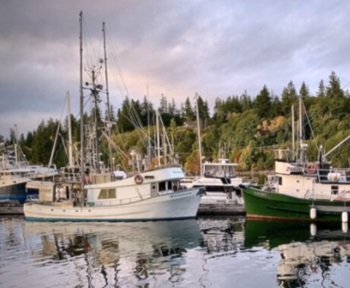 The West Coast fishing industry finds itself in increasingly troubled waters, according to a recent report from the Standing Committee on Fisheries and Oceans (FOPO). The parliamentary committee says unfair regulations and a lack of federal intervention have led to an uneven playing field for BC fishers. Unlike the Maritime provinces, where regulations limit corporate control and prioritize independent harvesters, there are no restrictions on ownership of commercial licenses and quotas on BC’s coast. As a result, owner-operators are often shut out of the process, jeopardizing their ability to make a sustainable living. “Fisheries are the fabric of our coastal communities, and they have been particularly in Indigenous communities for 10 to 15,000 years. Fish in the water are the birthright of all Canadians,” Sonia Strobel, CEO of Skipper Otto Community Supported Fishery, told us in an interview. photos, more, >>click to read<< 07:45
The West Coast fishing industry finds itself in increasingly troubled waters, according to a recent report from the Standing Committee on Fisheries and Oceans (FOPO). The parliamentary committee says unfair regulations and a lack of federal intervention have led to an uneven playing field for BC fishers. Unlike the Maritime provinces, where regulations limit corporate control and prioritize independent harvesters, there are no restrictions on ownership of commercial licenses and quotas on BC’s coast. As a result, owner-operators are often shut out of the process, jeopardizing their ability to make a sustainable living. “Fisheries are the fabric of our coastal communities, and they have been particularly in Indigenous communities for 10 to 15,000 years. Fish in the water are the birthright of all Canadians,” Sonia Strobel, CEO of Skipper Otto Community Supported Fishery, told us in an interview. photos, more, >>click to read<< 07:45
Clearwater Seafoods loses redfish quota as other Indigenous harvesters gain
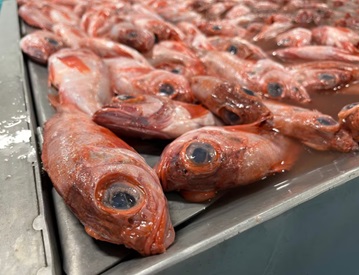 Indigenous-owned Clearwater Seafoods is on the losing side of the redfish quota cut handed to the Atlantic Canadian offshore fleet by the federal government last week. The Department of Fisheries and Oceans reduced the share of Gulf of St. Lawrence redfish quota held by Clearwater and other offshore licence holders by 20 per cent, in part to encourage Indigenous participation in the fishery. Commercial harvesting will restart this year, marking an epic comeback from a collapse 30 years ago to a population now estimated at 2.2-million metric tonnes. Offshore companies spent tens of millions of dollars gearing up for the return only to lose a big piece of their quota on the eve of reopening. photos, more, <<click to read<< 14:11
Indigenous-owned Clearwater Seafoods is on the losing side of the redfish quota cut handed to the Atlantic Canadian offshore fleet by the federal government last week. The Department of Fisheries and Oceans reduced the share of Gulf of St. Lawrence redfish quota held by Clearwater and other offshore licence holders by 20 per cent, in part to encourage Indigenous participation in the fishery. Commercial harvesting will restart this year, marking an epic comeback from a collapse 30 years ago to a population now estimated at 2.2-million metric tonnes. Offshore companies spent tens of millions of dollars gearing up for the return only to lose a big piece of their quota on the eve of reopening. photos, more, <<click to read<< 14:11
Atlantic Groundfish Council Pleased With Redfish Allocation
 The shrimp biomass is declining significantly, and FFAW Secretary-Treasurer Jason Spingle fully expected DFO to give shrimpers access to a meaningful allocation of redfish. The year-round harvesters are generally pleased with the amount of redfish allocated to them. For the first time in decades, Ottawa is opening the redfish fishery in the Gulf of St. Lawrence. The Atlantic Groundfish Council says their sector lost 20 per cent of their historical share in the decision. Generally though, they praise DFO for resisting more drastic change in the total allowable catch. more, >>click to read<< 10:01
The shrimp biomass is declining significantly, and FFAW Secretary-Treasurer Jason Spingle fully expected DFO to give shrimpers access to a meaningful allocation of redfish. The year-round harvesters are generally pleased with the amount of redfish allocated to them. For the first time in decades, Ottawa is opening the redfish fishery in the Gulf of St. Lawrence. The Atlantic Groundfish Council says their sector lost 20 per cent of their historical share in the decision. Generally though, they praise DFO for resisting more drastic change in the total allowable catch. more, >>click to read<< 10:01
Why Canada has ordered lobster pounds to kill all egg-bearing female lobsters
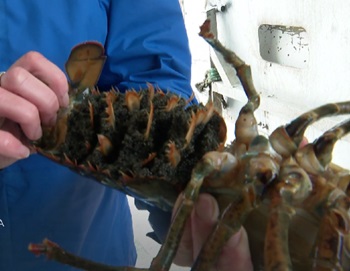 In an effort to reduce the spread of marine invasive species, Canada ordered lobster pounds to to kill all egg-bearing female lobsters. But two years after the measure was introduced, some in the business are still unaware of the requirement. The Department of Fisheries and Oceans has banned the long-held practice of releasing egg-bearing or “berried” female lobsters when they are discovered in holding facilities. Instead pounds “must immediately euthanize the lobster,” according to licence conditions quietly introduced in January 2022. Video, more, >>click to read<< 07:12
In an effort to reduce the spread of marine invasive species, Canada ordered lobster pounds to to kill all egg-bearing female lobsters. But two years after the measure was introduced, some in the business are still unaware of the requirement. The Department of Fisheries and Oceans has banned the long-held practice of releasing egg-bearing or “berried” female lobsters when they are discovered in holding facilities. Instead pounds “must immediately euthanize the lobster,” according to licence conditions quietly introduced in January 2022. Video, more, >>click to read<< 07:12
Canada plans crackdown as trade data shows elver exports were 4 times the legal catch in 2022
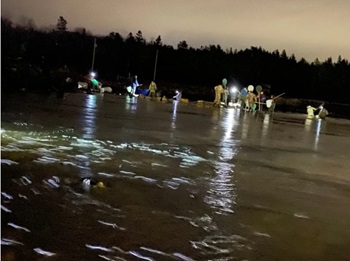 Fisheries and Oceans Canada (DFO) plans to crack down on the illegal fishery for baby eels, also known as elvers, in the Maritimes next year by creating separate possession-and-export licences to track the catch from river to airport. The effort comes as newly reported trade data shows a huge surge in elver exports leaving Canada, reaching an all time high of 43 tonnes in 2022 — four times the authorized Canadian total allowable catch. To avoid a repeat of the chaos and deter the illegal trade, DFO wants new regulations in place by March 2024, ahead of the spring elver migration and fishing season. photos, more, >>click to read<< 14:32
Fisheries and Oceans Canada (DFO) plans to crack down on the illegal fishery for baby eels, also known as elvers, in the Maritimes next year by creating separate possession-and-export licences to track the catch from river to airport. The effort comes as newly reported trade data shows a huge surge in elver exports leaving Canada, reaching an all time high of 43 tonnes in 2022 — four times the authorized Canadian total allowable catch. To avoid a repeat of the chaos and deter the illegal trade, DFO wants new regulations in place by March 2024, ahead of the spring elver migration and fishing season. photos, more, >>click to read<< 14:32
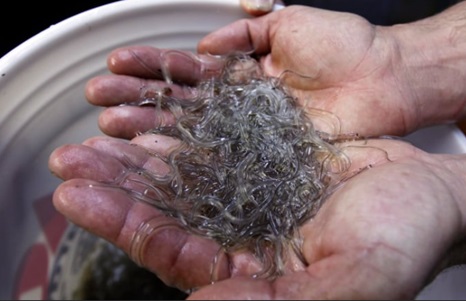
Tonnes of elvers were poached in 2023, but border agents didn’t find any
The disclosure came from Daniel Anson, the agency’s director of general intelligence and investigations, during a recent appearance before the standing Fisheries and Oceans Canada parliamentary committee examining illegal, unreported and unregulated fishing. “We have not had any seizures of elver eels this specific year. We have effected a variety of different examinations to ensure compliance and have not found anything that was illicit or destined abroad that had been harvested illegally or the result of unreported fishing,” Anson testified last week. That was greeted with scorn by one Nova Scotia MP. Elvers are Canada’s most valuable seafood species by weight, fetching up to $5,000 per kilogram. more, >>click to read<< 11:53
B.C. salmon farms linked to explosive spike in wild fish deaths
B.C. salmon farms killed more than 800,000 wild fish in 2022, 16 times more than the last decade’s yearly average, federal data shows. The unprecedented spike in aquaculture bycatch accounts for more dead fish in one year than the combined death toll over the previous 10 years. In one graphic example, video captured at a Cermaq facility in Clayoquot Sound shows herring floundering at the surface after getting sucked into a powerful machine meant to remove sea lice from farmed salmon. Stan Proboszcz, a senior scientist at Watershed Watch Salmon Society, said he has never seen anything like it. “All these herring that went through the hydrolicer had their eyes blown out,” Proboszcz said. “It’s horrific.” more, photos, >>click to read<< 18:07
P.E.I. Fishermen’s Association calls for more timely, better monitoring in wake of federal report
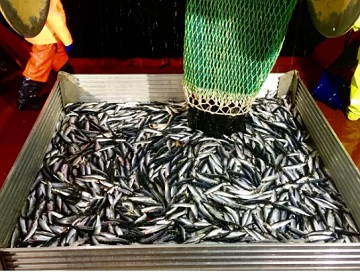 Executive director Ian MacPherson said a recent report from the federal environment commissioner underlined the importance of doing more, and better science, especially as the crucial herring and mackerel fisheries remain closed to Island fishers. “Herring and mackerel are the big ones here on Prince Edward Island, important fisheries to us, and we’d like to get them reopened — and we realize these are science-based decisions, but you need accurate and timely information,” MacPherson said. >>click to read<< 06:38
Executive director Ian MacPherson said a recent report from the federal environment commissioner underlined the importance of doing more, and better science, especially as the crucial herring and mackerel fisheries remain closed to Island fishers. “Herring and mackerel are the big ones here on Prince Edward Island, important fisheries to us, and we’d like to get them reopened — and we realize these are science-based decisions, but you need accurate and timely information,” MacPherson said. >>click to read<< 06:38






